Everyone knows that selling age-restricted items can be a minefield, but things could be about to get a bit more complicated for retailers selling cigarettes. The chances are that some of your customers are probably aged between the ages of 16 and 18 and at the moment it's perfectly legal to sell them tobacco products. However, imagine selling a packet of 10 cigarettes to a 17-year-old one day and then having to turn him away the next because he's too young to buy them. With current discussion on raising the legal age for buying tobacco products gaining momentum, this hypothetical situation could be a reality sooner than you think.
The legal age for buying cigarettes has been the same for nearly 100 years - 16 since 1908. But a recently published government consultation document entitled Consultation on Under-Age Sale of Tobacco, subtitled Changing the age of sale and strengthening sanctions against retailers for under-age sale of tobacco puts forward three proposals to the debate: sticking with 16; increasing the age limit to 17; and increasing the age limit to 18, in line with alcohol. Option three is the government's preferred policy.
The Department of Health's argument against maintaining the current age limit includes the fact that alcohol, solvents and lighter refills are age-restricted at 18 and to stick with 16 for tobacco sends out a misleading message.
In addition, the government says that having a uniform minimum age for tobacco, alcohol, fireworks, solvents and lighter refills would simplify enforcement, with retailers having only one age to be concerned about.
The consultation document says: "Increasing the legal age for tobacco sales would demonstrate that
the government is serious about cutting the number of young smokers in England and Wales."
The government also says that raising the age to 18 would go some way to keeping tobacco out of secondary schools and reduce peer influence on younger children. And it seems that raising the age has the support of the general public. A MORI poll for the BBC in 2004 reported that 80% of adults were
in favour of it.
When it comes to the impact of all this on small businesses, the government notes: "There may be a small drop in sales to young customers, although informal consultation with these businesses suggests that the losses will not be significant. Losses may also be replaced by increased purchases of non-tobacco products."
It adds that it has held informal discussions with the Association of Convenience Stores and Rural Shops Alliance and they suggested that many retailers would welcome the change. "Age is quite often difficult to ascertain and there is a general feeling that 18-year-olds are easier to recognise than 16-year-olds. This change will simplify matters by bringing the law into line with other similarly viewed products such as alcohol."
The document continues: "Small businesses do ask, though, that any changes are well publicised to both business and the public at least three months in advance."
Despite the best efforts of the tobacco companies, Trading Standards and retailers, underage sales of tobacco are still very much a problem in convenience stores.According to the consultation document - itself a response to a sharp rise in underage smoking between 1988 and 1996 - the government set a target to reduce the percentage of young smokers to 9% or less by 2010. This target has already been reached and the percentage of 11- to 15-year-olds who smoke has remained steady at 9% for the past four years. However, the document says that most regular adult smokers start smoking as teenagers, with 38% of smokers starting before they reach the age of 16. "This demonstrates that access to cigarettes by under-16s has not been as difficult as it should be. This is partly due to retailers selling tobacco products to those under the legal age and partly to children acquiring cigarettes from sources other than shops, such as friends or vending machines."
Information from a survey carried out in 2004 (Smoking, Drinking and Drug Use Among Young People in England) found that 'small shops' were the number one place for kids to get their cigarettes, followed by 'from their friends'. In 2004, 17% of children aged 11-15 tried to buy cigarettes from shops and only 23% of those found it difficult to do so. Of the children who did make a successful purchase, just over half had been refused at least once.
Enforcement of current legislation lies with local Trading Standards authorities and, of course, test purchasing is a favoured way of policing this. In the year ending March 2005, 60% of local authorities with Trading Standards responsibilities used volunteer children under the age of 16 to make test purchases in 1,350 premises. Tobacco products were sold in 12% of these tests.
There were 73 prosecutions for selling tobacco to minors in England and Wales in 2004 (the latest year for which figures are available) and 57 defendants were found guilty. However, most local authorities do not prosecute for under-age sales - a written or verbal warning is given in almost 80% of cases. And when fines are given out they are relatively small. The maximum fine that can be given is £2,500, but the average fine handed out is only £350.
The government has a six-strand tobacco control programme comprising: reducing exposure to second-hand smoke; media/educational campaigns; NHS stop smoking services and nicotine replacement therapy; reducing advertising and promotion; regulating tobacco products; and reducing availability of tobacco products and regulating supply. The measures proposed to reduce under-age sales are covered by the final strand.
When it comes to sanctions against retailers caught selling cigarettes to the under-aged, the government wants to ban retailers from selling tobacco if they repeatedly flout the law.
It puts forward two methods of doing this. The first would be to create a licensing system similar to the one for alcohol sales, where a licence can be revoked if a retailer repeatedly sells tobacco to under-aged customers. Alternatively, there is a 'negative licensing system', where a retailer could be prohibited from selling tobacco if they are found to be breaking the law. The government favours the negative licensing system.
This would still be policed by Tradings Standards, and selling tobacco to children would have to be proved through test purchases. Three instances of selling tobacco to minors would need to be proved within a three-year period before a prohibition order could be sought. The order would last for a maximum of a year.
The government wants such prohibition orders to apply to the store where the offence occurred and to the manager of the premises. Its view is that the risk of a prohibition order would demonstrate how seriously the authorities consider selling tobacco to children.
The proposals relating to under-age sales would apply only in England and Wales, while those relating to retailer sanctions would apply in England, Wales and Northern Ireland. Northern Ireland is considering the age question separately, while Scotland is looking at both issues independently.
Commenting on the age-raising proposals, public health minister Caroline Flint says: "Access to cigarettes by under 16s is not as difficult as it should be and this is partly due to retailers selling tobacco to those under the legal age. If a particular shop is known locally as the place for children and teenagers to easily buy tobacco, we want to stop that shop selling it."
Meanwhile, in Scotland, health minister Andy Kerr says he's expecting to receive the Scottish Executive's Smoking Prevention Working Group's final report soon
- including its recommendations on raising the age limit for purchasing tobacco. Kerr says: "I believe that raising the age of purchase would be an important step forward, and I'd be very surprised if the group does not recommend raising the age requirement to 18.
"The smoking legislation gives us the power to take this step and I am prepared to back any proposal which I think will help tackle Scotland's ill-health."
Supermarket giant Asda has already taken that step and raised the minimum age for buying cigarettes (and knives) in its stores from 16 to 18. This came into effect on September 1, 2006. A spokesman for Asda told Convenience Store: "So far the feedback from stores has been very positive. Staff find it easier to implement, and most under-18s we've spoken to about our new cigarette policy have been very supportive."
Whether your 16- and 17-year-old customers would be as supportive of a change in the law is another matter, but it's something you might well find out soon.
Dundee Council bosses were shocked to find that six out of 15 retailers in the city had sold tobacco and lighter fluid to under-age purchasers. The retailers were caught in a test purchasing exercise and have been warned that they face prosecution if there are any repeat incidents. Dundee councillors say they are considering expanding the test purchases to other products.
This latest case follows one earlier in the summer where test purchasing revealed that four out of 18 stores in Dumfries and Galloway sold cigarettes to kids. In this case Trading Standards was particularly concerned because it had sent out letters and guidance leaflets in advance to all the retailers it was planning to visit.
Kevin Hunt, managing director of the Lawrence Hunt chain of 27 Spar stores in the North-west, says that as a member of the public he agrees with anything that stops young people smoking. However, as a retailer, a change in the age for buying cigarettes will provide him with a real headache.
"Of course, any change would be publicised in the media so hopefully most people would be aware of it, but I just think it's another cop-out, like with alcohol. I can be punished for selling alcohol to a 16-year-old but nothing happens to the 16-year-olds seen drinking alcohol."
Kevin makes an interesting point because when it comes to smoking, under the Children and Young Persons Act 1933, 'constables and park-keepers' have a duty to seize tobacco and cigarette papers from persons who are smoking in public places and appear to be under the age of 16. Whether this happens any more is anybody's guess.
Kevin continues: "I think that as retailers we're easy targets. We don't have a lot of problems in our stores as we take a zero tolerance approach - the only problem we do have is the abuse we receive when we turn youngsters away.
"We get test purchases done all the time - on alcohol and tobacco - and we carry out our own, plus we're always sending memos out to staff to remind them of the law. However, it only takes a split second for an under-age sale to go through because a member of staff has lost concentration. And it's very difficult when you're trading for 95-100 hours a week to concentrate all the time. We've got 520 staff and it only takes one of them to let you down. If we had a national ID card it would be easier.
"I'm 100% behind any legislation against retailers who actively sell to under-age drinkers and smokers. However, it would be really frustrating if a good retailer got caught for a one-off offence when retailers who regularly sell to under-age kids continue to do so because they've never had test purchases in their store."
The legal age for buying cigarettes has been the same for nearly 100 years - 16 since 1908. But a recently published government consultation document entitled Consultation on Under-Age Sale of Tobacco, subtitled Changing the age of sale and strengthening sanctions against retailers for under-age sale of tobacco puts forward three proposals to the debate: sticking with 16; increasing the age limit to 17; and increasing the age limit to 18, in line with alcohol. Option three is the government's preferred policy.
The Department of Health's argument against maintaining the current age limit includes the fact that alcohol, solvents and lighter refills are age-restricted at 18 and to stick with 16 for tobacco sends out a misleading message.
In addition, the government says that having a uniform minimum age for tobacco, alcohol, fireworks, solvents and lighter refills would simplify enforcement, with retailers having only one age to be concerned about.
The consultation document says: "Increasing the legal age for tobacco sales would demonstrate that
the government is serious about cutting the number of young smokers in England and Wales."
The government also says that raising the age to 18 would go some way to keeping tobacco out of secondary schools and reduce peer influence on younger children. And it seems that raising the age has the support of the general public. A MORI poll for the BBC in 2004 reported that 80% of adults were
in favour of it.
When it comes to the impact of all this on small businesses, the government notes: "There may be a small drop in sales to young customers, although informal consultation with these businesses suggests that the losses will not be significant. Losses may also be replaced by increased purchases of non-tobacco products."
It adds that it has held informal discussions with the Association of Convenience Stores and Rural Shops Alliance and they suggested that many retailers would welcome the change. "Age is quite often difficult to ascertain and there is a general feeling that 18-year-olds are easier to recognise than 16-year-olds. This change will simplify matters by bringing the law into line with other similarly viewed products such as alcohol."
The document continues: "Small businesses do ask, though, that any changes are well publicised to both business and the public at least three months in advance."
Despite the best efforts of the tobacco companies, Trading Standards and retailers, underage sales of tobacco are still very much a problem in convenience stores.According to the consultation document - itself a response to a sharp rise in underage smoking between 1988 and 1996 - the government set a target to reduce the percentage of young smokers to 9% or less by 2010. This target has already been reached and the percentage of 11- to 15-year-olds who smoke has remained steady at 9% for the past four years. However, the document says that most regular adult smokers start smoking as teenagers, with 38% of smokers starting before they reach the age of 16. "This demonstrates that access to cigarettes by under-16s has not been as difficult as it should be. This is partly due to retailers selling tobacco products to those under the legal age and partly to children acquiring cigarettes from sources other than shops, such as friends or vending machines."
Information from a survey carried out in 2004 (Smoking, Drinking and Drug Use Among Young People in England) found that 'small shops' were the number one place for kids to get their cigarettes, followed by 'from their friends'. In 2004, 17% of children aged 11-15 tried to buy cigarettes from shops and only 23% of those found it difficult to do so. Of the children who did make a successful purchase, just over half had been refused at least once.
Enforcement of current legislation lies with local Trading Standards authorities and, of course, test purchasing is a favoured way of policing this. In the year ending March 2005, 60% of local authorities with Trading Standards responsibilities used volunteer children under the age of 16 to make test purchases in 1,350 premises. Tobacco products were sold in 12% of these tests.
There were 73 prosecutions for selling tobacco to minors in England and Wales in 2004 (the latest year for which figures are available) and 57 defendants were found guilty. However, most local authorities do not prosecute for under-age sales - a written or verbal warning is given in almost 80% of cases. And when fines are given out they are relatively small. The maximum fine that can be given is £2,500, but the average fine handed out is only £350.
The government has a six-strand tobacco control programme comprising: reducing exposure to second-hand smoke; media/educational campaigns; NHS stop smoking services and nicotine replacement therapy; reducing advertising and promotion; regulating tobacco products; and reducing availability of tobacco products and regulating supply. The measures proposed to reduce under-age sales are covered by the final strand.
When it comes to sanctions against retailers caught selling cigarettes to the under-aged, the government wants to ban retailers from selling tobacco if they repeatedly flout the law.
It puts forward two methods of doing this. The first would be to create a licensing system similar to the one for alcohol sales, where a licence can be revoked if a retailer repeatedly sells tobacco to under-aged customers. Alternatively, there is a 'negative licensing system', where a retailer could be prohibited from selling tobacco if they are found to be breaking the law. The government favours the negative licensing system.
This would still be policed by Tradings Standards, and selling tobacco to children would have to be proved through test purchases. Three instances of selling tobacco to minors would need to be proved within a three-year period before a prohibition order could be sought. The order would last for a maximum of a year.
The government wants such prohibition orders to apply to the store where the offence occurred and to the manager of the premises. Its view is that the risk of a prohibition order would demonstrate how seriously the authorities consider selling tobacco to children.
The proposals relating to under-age sales would apply only in England and Wales, while those relating to retailer sanctions would apply in England, Wales and Northern Ireland. Northern Ireland is considering the age question separately, while Scotland is looking at both issues independently.
Commenting on the age-raising proposals, public health minister Caroline Flint says: "Access to cigarettes by under 16s is not as difficult as it should be and this is partly due to retailers selling tobacco to those under the legal age. If a particular shop is known locally as the place for children and teenagers to easily buy tobacco, we want to stop that shop selling it."
Meanwhile, in Scotland, health minister Andy Kerr says he's expecting to receive the Scottish Executive's Smoking Prevention Working Group's final report soon
- including its recommendations on raising the age limit for purchasing tobacco. Kerr says: "I believe that raising the age of purchase would be an important step forward, and I'd be very surprised if the group does not recommend raising the age requirement to 18.
"The smoking legislation gives us the power to take this step and I am prepared to back any proposal which I think will help tackle Scotland's ill-health."
Supermarket giant Asda has already taken that step and raised the minimum age for buying cigarettes (and knives) in its stores from 16 to 18. This came into effect on September 1, 2006. A spokesman for Asda told Convenience Store: "So far the feedback from stores has been very positive. Staff find it easier to implement, and most under-18s we've spoken to about our new cigarette policy have been very supportive."
Whether your 16- and 17-year-old customers would be as supportive of a change in the law is another matter, but it's something you might well find out soon.
Caught in the act
Dundee Council bosses were shocked to find that six out of 15 retailers in the city had sold tobacco and lighter fluid to under-age purchasers. The retailers were caught in a test purchasing exercise and have been warned that they face prosecution if there are any repeat incidents. Dundee councillors say they are considering expanding the test purchases to other products.
This latest case follows one earlier in the summer where test purchasing revealed that four out of 18 stores in Dumfries and Galloway sold cigarettes to kids. In this case Trading Standards was particularly concerned because it had sent out letters and guidance leaflets in advance to all the retailers it was planning to visit.
Retailer's view
Kevin Hunt, managing director of the Lawrence Hunt chain of 27 Spar stores in the North-west, says that as a member of the public he agrees with anything that stops young people smoking. However, as a retailer, a change in the age for buying cigarettes will provide him with a real headache.
"Of course, any change would be publicised in the media so hopefully most people would be aware of it, but I just think it's another cop-out, like with alcohol. I can be punished for selling alcohol to a 16-year-old but nothing happens to the 16-year-olds seen drinking alcohol."
Kevin makes an interesting point because when it comes to smoking, under the Children and Young Persons Act 1933, 'constables and park-keepers' have a duty to seize tobacco and cigarette papers from persons who are smoking in public places and appear to be under the age of 16. Whether this happens any more is anybody's guess.
Kevin continues: "I think that as retailers we're easy targets. We don't have a lot of problems in our stores as we take a zero tolerance approach - the only problem we do have is the abuse we receive when we turn youngsters away.
"We get test purchases done all the time - on alcohol and tobacco - and we carry out our own, plus we're always sending memos out to staff to remind them of the law. However, it only takes a split second for an under-age sale to go through because a member of staff has lost concentration. And it's very difficult when you're trading for 95-100 hours a week to concentrate all the time. We've got 520 staff and it only takes one of them to let you down. If we had a national ID card it would be easier.
"I'm 100% behind any legislation against retailers who actively sell to under-age drinkers and smokers. However, it would be really frustrating if a good retailer got caught for a one-off offence when retailers who regularly sell to under-age kids continue to do so because they've never had test purchases in their store."



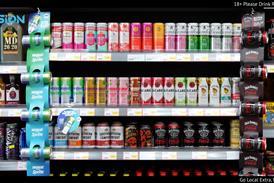
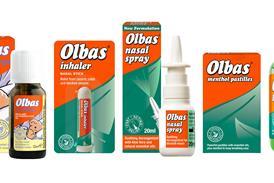



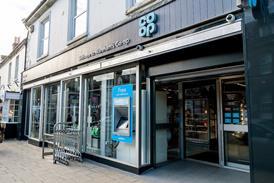
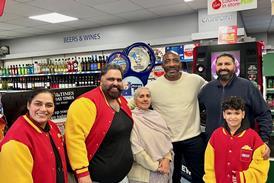









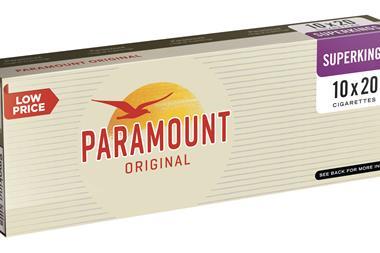


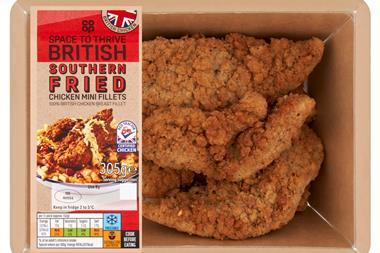

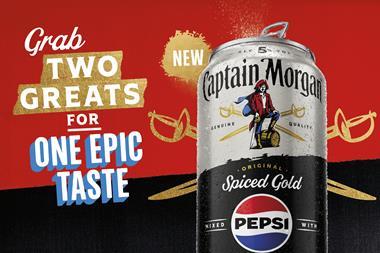

No comments yet